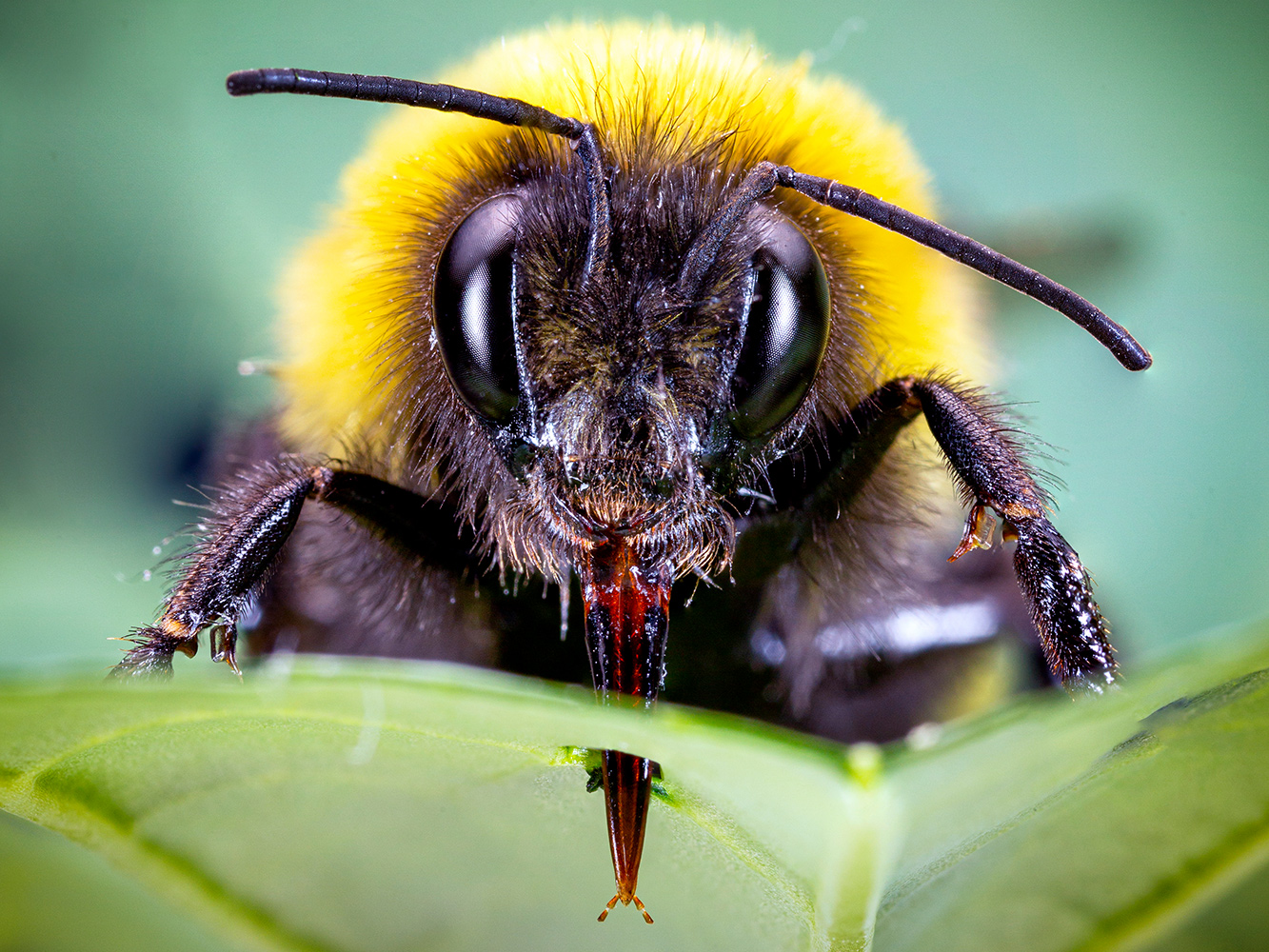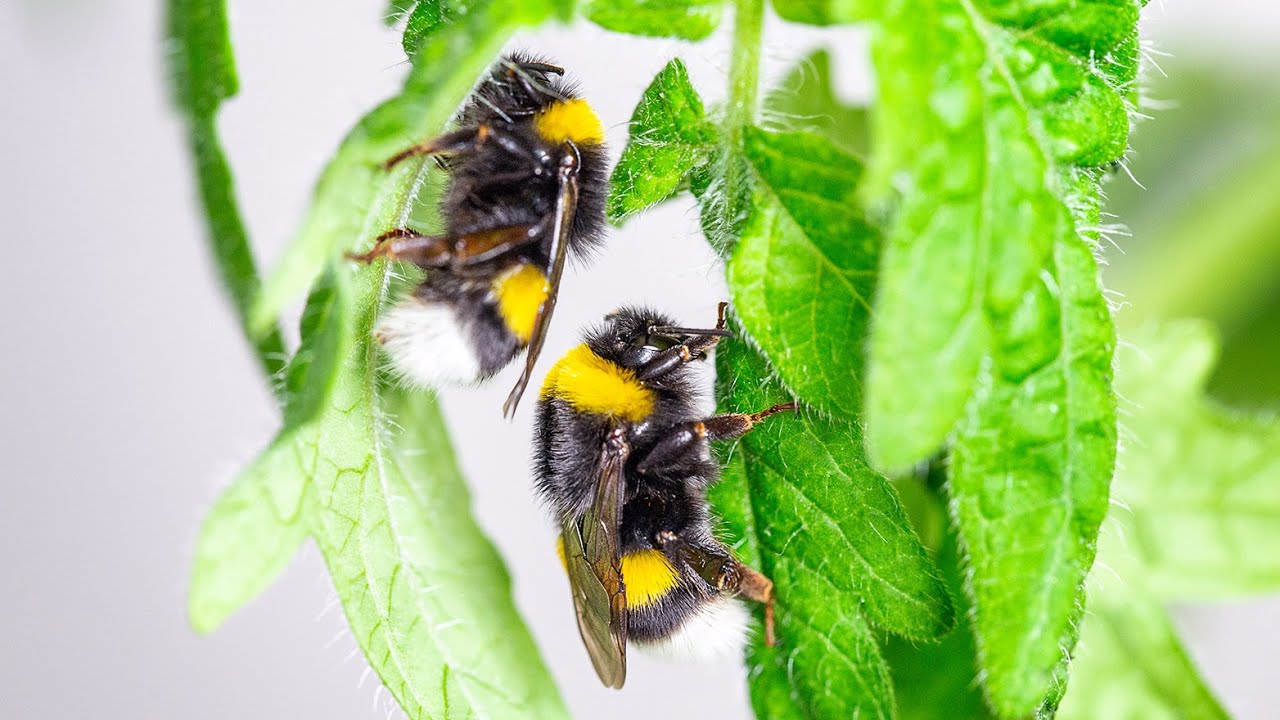Welcome to DU!
The truly grassroots left-of-center political community where regular people, not algorithms, drive the discussions and set the standards.
Join the community:
Create a free account
Support DU (and get rid of ads!):
Become a Star Member
Latest Breaking News
General Discussion
The DU Lounge
All Forums
Issue Forums
Culture Forums
Alliance Forums
Region Forums
Support Forums
Help & Search
Science
Related: About this forumPollen-starved bumblebees bite 'half-moons' into plants to make them bloom
By Nicoletta Lanese - Staff Writer an hour ago
Scientists don't yet know when or how the behavior evolved.

(Image: © Hannier Pulido, De Moraes and Mescher Laboratories)
When their pollen supply runs short, bumblebees bore tiny half-moon-shaped holes in the leaves of flowering plants, causing blooms to appear weeks ahead of schedule.
Bee-bitten plants bear flowers about two weeks to a month sooner than untouched plants, according to a new study, published today (May 21) in the journal Science. Researchers attempted to recreate these bee-bite patterns using metal forceps and a razor, but even then, the damage inflicted by bees boosted flower production more effectively than the scientists could; bee-bitten plants bloomed eight to 25 days before the artificially damaged ones did, depending on the plant species.
Some plant species flower early in response to drought, or in response to infections caused by certain pathogens, but few studies have explored how animal behaviors might prompt plants to bloom early, said study author Mark Mescher, a professor of environmental systems science at ETH Zürich. Mescher and his coauthor Consuelo De Moraes, a professor of biocommunication and ecology at ETH Zürich, spotted bumblebees munching on leaves during an unrelated experiment, and they wondered why.
"It started really with observing the behavior," Mescher said. Other researchers told the team that they'd also observed bees biting leaves, anecdotally, but no formal studies had probed why the insects did it, he said.
More:
https://www.livescience.com/bumblebee-bites-make-flowers-bloom-early.html
InfoView thread info, including edit history
TrashPut this thread in your Trash Can (My DU » Trash Can)
BookmarkAdd this thread to your Bookmarks (My DU » Bookmarks)
4 replies, 948 views
ShareGet links to this post and/or share on social media
AlertAlert this post for a rule violation
PowersThere are no powers you can use on this post
EditCannot edit other people's posts
ReplyReply to this post
EditCannot edit other people's posts
Rec (19)
ReplyReply to this post
4 replies
 = new reply since forum marked as read
Highlight:
NoneDon't highlight anything
5 newestHighlight 5 most recent replies
= new reply since forum marked as read
Highlight:
NoneDon't highlight anything
5 newestHighlight 5 most recent replies
Pollen-starved bumblebees bite 'half-moons' into plants to make them bloom (Original Post)
Judi Lynn
May 2020
OP
SWBTATTReg
(22,112 posts)1. A clever trick, w/ perhaps application for human use? Neat!
BComplex
(8,036 posts)2. Fascinating how nature knows so much the rest of us haven't figured out.
It boggles the mind what goes on in our world that we have no clue about.
![]()
jeffreyi
(1,939 posts)3. Wow.
Keats, again.
Judi Lynn
(160,516 posts)4. Bumblebees speed up flowering
22.05.2020 | News
By: Peter Rüegg
When pollen is in short supply, bumblebees damage plant leaves in a way that accelerates flower production, as an ETH research team headed up by Consuelo De Moraes and Mark Mescher has demonstrated.

If bumblebees find too little pollen, they pierce the leaves of non-flowering plants in order to force them to produce flowers more quickly. (Photograph: Hannier Pulido / ETH Zurich)
Spring has sprung earlier than ever before this year, accompanied by temperatures more typical of early summertime. Many plants were already in full bloom by mid-April, about three to four weeks earlier than normal. These types of seasonal anomalies are becoming increasingly frequent due to climate change, and the resulting uncertainty threatens to disrupt the timing of mutualistic relationships between plants and their insect pollinators.
A research team led by ETH Professors Consuelo De Moraes and Mark Mescher has now discovered that one peculiar bumblebee behaviour may help to overcome such challenges by facilitating coordination between the bees and the plants they pollinate. The group has found that bumblebee workers use their mouth parts to pinch into the leaves of plants that haven’t flowered yet, and that the resulting damage stimulates the production of new flowers that bloom earlier than those on plants that haven’t been given this “nudge”.
Their study has just been published in the journal Science. “Previous work has shown that various kinds of stress can induce plants to flower, but the role of bee-inflicted damage in accelerating flower production was unexpected,” Mescher says.

Surprising behaviour from bumblebees
The researchers first noticed the behaviour during other experiments being undertaken by one of the authors, Foteini Pashalidou: pollinators were biting the leaves of test plants in the greenhouse. “On further investigation, we found that others had also observed such behaviours, but no one had explored what the bees were doing to the plants or reported an effect on flower production,” Mescher explains.
More:
https://ethz.ch/en/news-and-events/eth-news/news/2020/05/bumblebees-speed-up-flowering.html